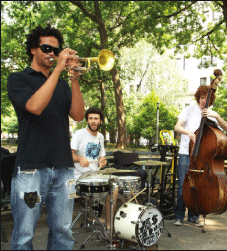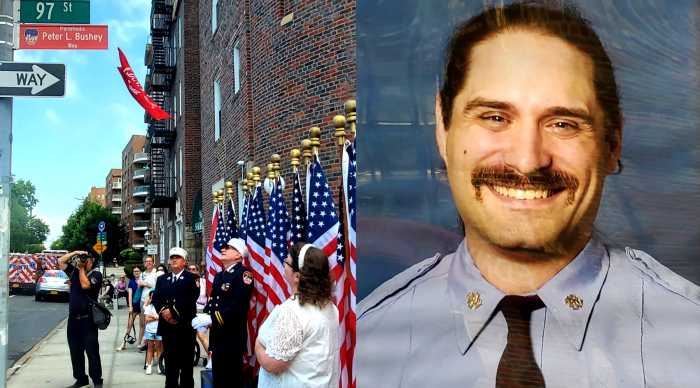By Lincoln Anderson
Bang the drum softly — or better yet, not at all.
That’s the message police and some neighborhood residents recently have been sending to drummers in Washington Square Park.
An unanticipated effect of the May reopening of the park renovation’s phase one is that the number of drummers in the world-famous park has exploded, while the volume of their albeit unamplified music has skyrocketed, according to residents.
Meanwhile, one of the drummers says they’re being targeted by a stealth unit of cell phone-camera-wielding seniors who are literally recording their every rim shot. But he and his band mates say Washington Square is a historically important public space for musicians and must be preserved as such.
Dancing to the beat of a different drummer entirely is former Mayor Ed Koch, who says drums should be banned in parks.
“I’m against drumming in any local park,” said Hizzoner, who lives on Fifth Ave. right off the park. “I think that disturbs in an unreasonable way people who come to enjoy the park. I am for folk singing. …
“You can’t dream when people are drumming,” Koch said. “Parks are supposed to be places where people can dream and smell the flowers.”
Matt Vorzimer, 25, of Harlem, drums with the Park Foundation, an acoustic jazz band that plays in the still-unrenovated section of the park in a small oval on a pathway east of the fountain. The band often divides into two quintets jamming separately nearby each other, though both promoting their same $10 CD. They perform in the park up to seven days a week, up to eight hours a day, from 10 a.m. to as late as 6 p.m.
Vorzimer — whose very modest-sized drum kit includes a 14-inch bass drum, two small snares and a cymbal or two — said the controversy is being drummed up by a handful of disgruntled residents.
“We have a few haters,” he said. “There are like two or three people who continually make complaints. Now we hear there’s a woman with a petition with 1,000 names of people who want to kick all drummers out of the park.
They’ve got these civilian-spy-cops running around and shooting photos of us; they’re these old ladies — possibly men — who want to see the culture disappear.”
However, Vorzimer did admit, “There’s a guy who plays pots and pans who’s insanely loud.” And Vorzimer noted that two weekends ago, “two dudes with heavy-metal drum sets” were in the park, thrashing out punk rock tunes.
The Park Foundation have played in Washington Square for three years, with a hiatus during the park’s renovation, during which they played in Central Park. Vorzimer said there now do, in fact, seem to be more musicians hitting the skins in the square.
“A lot of drummers have come,” he said. “It’s abnormal.”
It seems that a few very loud drummers are causing a crackdown on all of them.
“We’re being told that we can’t play the music the way we want to,” Vorzimer noted. “But if we have a crowd of 50 people, we want them to feel something.”
Police told them they have to keep the volume below a certain decibel level, which, in turn, keeps down their profits.
“We can adapt to that, it’s fine,” Vorzimer said. “But we’re making less money.”
Police first started talking to the drummers on July 10 about keeping down the noise, Vorzimer said. Things escalated to where police were confronting them every day. Finally, he said, a police officer recently told him drumming isn’t allowed in the park at all, and that he’d be ticketed if he continued.
The Parks Department’s park enforcement patrol, or PEP, officers aren’t hassling then, he said; rather, it’s police officers. However, the jazz group stresses they don’t want to focus on the PEP’s and police, but rather point out that it’s really just a small group of residents that seem be against them.
Anti-drum discrimination
Meanwhile, sax players, guitarists and others haven’t been getting warnings, Vorzimer noted. Drums are being singled out.
“In my mind, it’s the intrinsic American fear of the drum, that goes back to slavery,” he said, “of being fearful of the power of the drum.”
A longtime Washington Square tumbling act are also taking heat because of their drummer.
“You’ve got a situation where even Tic and Tac are under attack,” noted Vorzimer.
Gil Horowitz, presiding officer of the new Coalition for a Better Washington Square Park, confirmed that drummers are the park’s new Public Enemy No. 1, as far as he and other residents are concerned.
“Oh yes, we’re getting more complaints about that than anything,” he said. “More than the drug dealing — even more than the skateboarding on the new polished-granite benches, which is what bothers me most.”
Horowitz said his group doesn’t want to “change the culture of the park,” but that the renovated park just seems to be attracting a huge number of people, and along with it, more drummers.
“We never had the quantity of drums before and the volume of drums before,” he noted. “People near the park can’t eat their dinner or play at home with their children.”
Horowitz noted that at a meeting he had a week ago with Deputy Inspector Ray Caroli, the Sixth Precinct’s commanding officer, he told Caroli that residents want police to start cracking down on the deafening drums.
As Horowitz tells it, Caroli at first said he wasn’t sure what he could do, stressing that the precinct’s primary focus in the park remains combating drugs.
Caroli must have done something, though, Horowitz said, “because the noise has been sharply curtailed in the park since last Tuesday.”
A phone call to the Sixth Precinct wasn’t returned by press time.
Horowitz agreed that the noisiest of the park percussionists was “the pot-and-pan guy,” followed closely by Tic and Tac.
“Tic and Tac are nice guys — it’s just they’re noisy,” he noted.
As for the identity of the woman doing the anti-drum petition, Horowitz said he’d heard it was a Susan, but he wasn’t sure if it was Susan Goren — ironically, part of the group that fought and litigated against the park’s renovation — or Susan Furman.
The music patrol
Regarding the group who are conducting surveillance of the drummers, Horowitz said he knows one of them is named Bill and lives on W. Fourth St.
“Bill has an expensive camera — a good one with a telephoto lens,” Horowitz said. “He may be using it to collect evidence to complain.”
Horowitz said the fact that even those whom he calls the “anything-goes-in-the-park people” are concerned about the drumming shows it’s a problem.
“It is not me!” said Goren, asked if she was the Susan gathering signatures for the anti-drum petition. The Villager couldn’t reach Furman by press time.
But Goren agreed that the drumming’s din has been rattling the park and its surroundings.
“What has gone too far is the guy with the buckets — plaster buckets turned over, or whatever…Tic and Tac and the two jazz groups,” she said, apparently referring to the Park Foundation.
“The guys that play on the west side of the park are really good. They’re Japanese. They’re willing to use mutes on their instruments.
“Tic and Tac has a full set of drums — they’re really too loud. The guys on the east side are really too loud,” Goren said. “They hit their drums as hard as they can — and they’re ruining it for everyone.”
‘It used to be congas’
Horowitz recalled that in the late 1950s or early 1960s, some drums were banned in Washington Square.
“Bongos were permitted. Congas were prohibited — because of the deep percussive sound,” he said. Plus, he noted, “Under Ed Koch as mayor, half the park was a quiet zone.”
Koch, however, said he didn’t recall any quiet zone or conga ban.
On Monday, around 1 p.m., the Park Foundation were playing in their usual spot. Vorzimer kept the rhythm along with David Speranza on standup bass, while trumpet players alternately soloed over the mellow groove. Vorzimer’s drumming wasn’t loud, and when Speranza soloed on bass, he played even softer, mainly doing unobtrusive rim shots and tinny hi-hat claps.
A small group sat listening quietly on the benches across the path. Occasionally, a listener or passerby would drop a buck in the band’s bag and offer a smile and compliments. The group makes $60 to $100 on any given day, Vorzimer said.
Jamal, one of the trumpet players, noted there’s a rich history of musicians performing in New York’s public spaces, in general, and Washington Square Park, in particular. But the people who backed the park’s renovation are calling the shots, he said, and they don’t like music and are “making it their park.”
“Thousands of people come to this park specifically to hear music,” Jamal pointed out. “There are very few parks like this in America, in the whole country. … Sonny Rollins played in the streets. Coltrane played in the trains.”
If the musicians are kicked out of the park, he said, “the next Coltrane” might never be discovered.
However, Bill Castro, the Parks Department’s Manhattan commissioner, said the musicians don’t have to worry — as long as they keep their volume at acceptable levels.
“There’s no difference between the Parks Department and the police on this,” he said of the noise enforcement. “In fact, the precinct commander and I spoke with Councilmember Alan Gerson on this last week.” However, he added, “The police are taking the lead on this.”
Basically, the music volume can’t rise to “unreasonable noise,” Castro stated. What constitutes unreasonable noise, he said, would be “if you can hear it outside the park, or if you can hear it in the park not too far away.” He didn’t say exactly how far away, noting that the sound of music played on grass wouldn’t carry as far as that of music played on a hard surface.
Castro said the Parks Department regulations apply to all musicians, not just drummers, but that one drummer has been the main problem at Washington Square lately. The pots-and-pans guy?
“He’s the one,” Castro said. “I don’t think there are more drummers coming — it’s just that one drummer.”
If musicians are too loud, officers will first tell them to lower the volume, then, if necessary, tell them to stop; finally, officers will issue tickets if the musicians don’t comply, he said.
“We have a variety of combos and groups that have played there, and will continue to be there,” Castro assured of the park’s musicians. “But it can’t be unreasonable.”






































